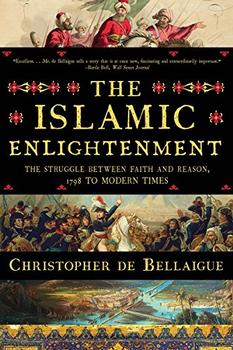Summary | Excerpt | Reading Guide | Reviews | Beyond the book | Read-Alikes | Genres & Themes | Author Bio

Michel Houellebecq's new book may be satirical and melancholic, but it is also hilarious, a comic masterpiece by one of France's great novelists.
It's 2022. François is bored. He's a middle-aged lecturer at the New Sorbonne University and an expert on J. K. Huysmans, the famous nineteenth-century Decadent author. But François's own decadence is considerably smaller in scale. He sleeps with his students, eats microwave dinners, rereads Huysmans, queues up YouPorn.
Meanwhile, it's election season. And although Francois feels "about as political as a bath towel," things are getting pretty interesting. In an alliance with the Socialists, France's new Islamic party sweeps to power. Islamic law comes into force. Women are veiled, polygamy is encouraged, and François is offered an irresistible academic advancement - on the condition that he convert to Islam.
Adam Gopnik in The New Yorker has said of Submission that "Houellebecq is not merely a satirist but - more unusually - a sincere satirist, genuinely saddened by the absurdities of history and the madnesses of mankind." Michel Houellebecq's new book may be satirical and melancholic, but it is also hilarious, a comic masterpiece by one of France's great novelists.
Despite the controversial subject matter, and Houellebecq's well-established reputation as an agent provocateur, there is no hysterical scaremongering to be found in this novel. It is a thoughtful, considered, well-informed imagining of an Islamic France. The religion itself and its leaders are, if anything, portrayed in a largely positive light. The reintroduction of religion into the everyday lives of the French people is an antidote to the widespread dissatisfaction, loneliness and lack of fulfilment that had been engendered by decades of living in a shallow consumerist society. That said, Houellebecq doesn't shy away from the less desirable consequences of living in an Islamic state, particularly for women. It is an augury, a feasible portent, a herald of a "maybe" future, with the author its possibly prescient avant-courier. More than anything, for good or ill, this is very much a book for our times...continued
Full Review
(960 words)
This review is available to non-members for a limited time. For full access,
become a member today.
(Reviewed by Sinéad Fitzgibbon).
 Michel Houellebecq (pronounced mish-elle wellbeck) is nothing if not an autobiographical writer. He has, in fact, become the poster child for a movement, prevalent in contemporary French literature, known as "auto-fiction" which sees authors unashamedly use fictionalized versions of their own lives in their novels. Autobiographical writing is addressed directly in Submission (fittingly through the protagonist, François). "An author is above all a human being, present in his books," he says, "and whether he writes well or very badly hardly matters as long as he gets the books written and is, indeed, present in them." François goes on to say that "to love a book is to love its author: we want to meet him again, we want to spend ...
Michel Houellebecq (pronounced mish-elle wellbeck) is nothing if not an autobiographical writer. He has, in fact, become the poster child for a movement, prevalent in contemporary French literature, known as "auto-fiction" which sees authors unashamedly use fictionalized versions of their own lives in their novels. Autobiographical writing is addressed directly in Submission (fittingly through the protagonist, François). "An author is above all a human being, present in his books," he says, "and whether he writes well or very badly hardly matters as long as he gets the books written and is, indeed, present in them." François goes on to say that "to love a book is to love its author: we want to meet him again, we want to spend ...
This "beyond the book" feature is available to non-members for a limited time. Join today for full access.

If you liked Submission, try these:

by Christopher de Bellaigue
Published 2018
A revelatory and game-changing narrative that rewrites everything we thought we knew about the modern history of the Islamic world.

by Leila Aboulela
Published 2017
A versatile prose stylist... [Aboulela's] lyrical style and incisive portrayal of Muslims living in the West received praise from the Nobel Prize winner J. M. Coetzee... [she is] a voice for multiculturalism." - New York Times